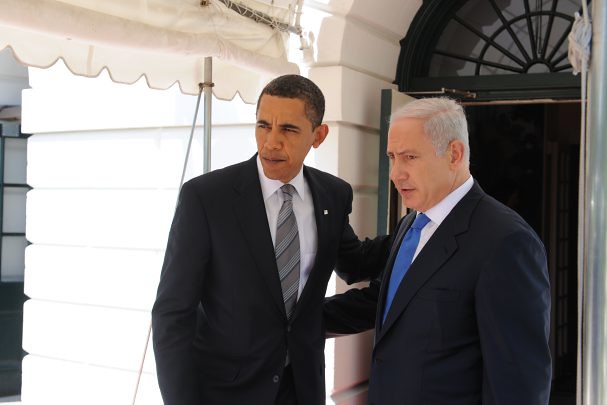
The Israeli-Palestinian peace talks that began in July of last year are closing in on the nine-month deadline set by their organizer, Secretary of State John Kerry. With this backdrop, Israeli Prime Minister Benjamin Netanyahu’s scheduled meeting with President Obama this week at the White House takes on special significance. The President has been noticeably quiet about the peace talks in recent months, and therefore many observers have been eagerly awaiting this meeting, as the two leaders are sure to discuss the current negotiations.
Enter the interview that The Atlantic’s Jeffrey Goldberg conducted just days ago with Obama, published over the weekend, in which the president spoke quite frankly about Israel’s situation vis-a-vis the Palestinians. With a sense of urgency in his choice of words, Obama commented in detail about the need for Israel to end the occupation lest its democratic values go wayward, America’s prospective inability to stem growing international boycotts and other moves against Israel, and issued a not-so-subtle challenge to rightist Israeli officials who oppose a two-state solution to the Arab-Israeli conflict:
“I have not yet heard, however, a persuasive vision of how Israel survives as a democracy and a Jewish state at peace with its neighbors in the absence of a peace deal with the Palestinians and a two-state solution. Nobody has presented me a credible scenario.”
On Israel’s future were it to continue the occupation indefinitely, Obama was equally as blunt:
“…there comes a point where you can’t manage this anymore, and then you start having to make very difficult choices. Do you resign yourself to what amounts to a permanent occupation of the West Bank? Is that the character of Israel as a state for a long period of time? Do you perpetuate, over the course of a decade or two decades, more and more restrictive policies in terms of Palestinian movement? Do you place restrictions on Arab-Israelis in ways that run counter to Israel’s traditions?”
Obama’s comments on defending Israel on the international stage in the event that no progress is made towards a two-state solution were also direct:
“…if you see no peace deal and continued aggressive settlement construction — and we have seen more aggressive settlement construction over the last couple years than we’ve seen in a very long time — if Palestinians come to believe that the possibility of a contiguous sovereign Palestinian state is no longer within reach, then our ability to manage the international fallout is going to be limited.”
Goldberg immediately asked the President if he did in fact mean “ability” – or “willingness” – to which the President replied “[N]ot necessarily willingness, but ability to manage international fallout is going to be limited. And that has consequences.”
Obama explained:
“Look, sometimes people are dismissive of multilateral institutions and the United Nations and the EU [European Union] and the high commissioner of such and such. And sometimes there’s good reason to be dismissive. There’s a lot of hot air and rhetoric and posturing that may not always mean much. But in today’s world, where power is much more diffuse, where the threats that any state or peoples face can come from non-state actors and asymmetrical threats, and where international cooperation is needed in order to deal with those threats, the absence of international goodwill makes you less safe. The condemnation of the international community can translate into a lack of cooperation when it comes to key security interests. It means reduced influence for us, the United States, in issues that are of interest to Israel. It’s survivable, but it is not preferable.”
With this, Obama has probably expressed one of the clearest statements of caution about Israel’s global standing and its consequences on American foreign policy that an American president ever has.
Finally, Obama dropped one more memorable line, which drew on a quote attributed to Rabbi Hillel, one of the greatest and most influential scholars in Jewish history: “If not now, when? And if not you, Mr. Prime Minister, then who? How does this get resolved?”
Prime Minister Netanyahu will most likely have read (or at least heard about) the interview by the time he meets with Obama. The timing of the interview was likely not a mere coincidence. The world will be waiting for Netanyahu’s response.